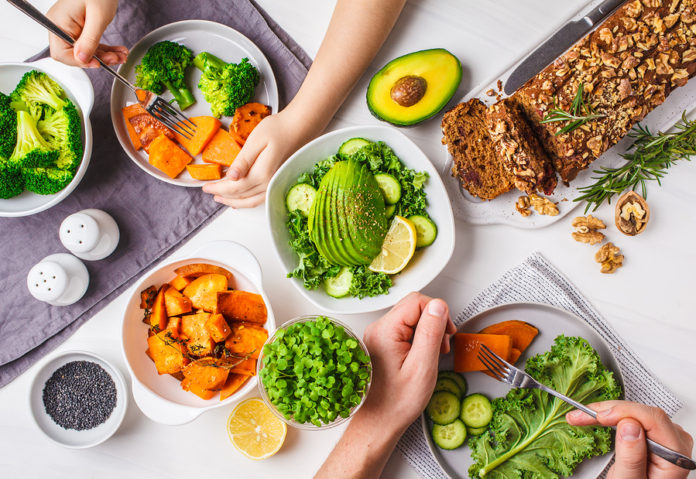
People often use the terms “vegan” and “plant-based” interchangeably. But according to a recent report from market research and consulting firm Linkage Research, there are notable differences in consumers and who follow the diet.
Popularity and adoption
The plant-based food market is exploding. Just over the last year, 13% more Americans report that it’s important to choose foods that are plant-based (16% in 2019 vs. 3% in 2018).
And the sales projections reflect the booming popularity of the plant-based diet. UBS projects that the plant-based protein and meat alternatives market alone could expand from $4.5 billion to a massive $85 billion by 2030. Plant-based dairy alternatives sales are taking off too, and could reach $37.5 billion by 2025.
Meanwhile, vegans account for 7% of the U.S. population. The global vegan food market size is projected to grow to $24.3 billion by 2026.
Why people adopt these diets
Linkage Research says the driving motivators for people to choose a plant-based diet are generally health-related, while vegans may hold strong ethical convictions.
| Plant-based diet adoption motivators | Vegan diet adoption motivators |
|
|
Diet adoption by age
Vegan diets are more popular with younger consumers — 60% of vegans are under 40. However, consumers who say eating plant-based foods is important span all ages, and they are significantly more prevalent in the 55+ age group than vegans.
| Age | Plant-based Important | Vegan — Ethical | Vegan — Health |
| 18-21 | 11% | 15% | 16% |
| 22-25 | 9% | 19% | 18% |
| 26-29 | 9% | 13% | 8% |
| 30-38 | 15% | 16% | 20% |
| 39-44 | 7% | 15% | 12% |
| 45-54 | 15% | 15% | 14% |
| 55-64 | 19% | 5% | 6% |
| 65+ | 15% | 1% | 7% |
Diet adoption by demographic
- 57% of health vegans are men
- 54% of plant-based consumers are women
- 50% of vegans are African-American and Hispanic
- Nearly 40% of plant-based consumers are African-American, Hispanic, or Asian
Claim acceptance rate and food choices
According to Linkage Research’s findings, it appears that among the three groups, consumers don’t accept vegan and plant-based claims at the same rate. Foods with plant-based claims are the clear crowd-pleasers.
| Reported purchase | Plant-based Important | Vegan — Ethical | Vegan — Health |
| Plant-based meat, seafood, and dairy alternatives | 71% | 73% | 68% |
| Food and beverages labeled “vegan” | 38% | 56% | 43% |
All three groups are buying more fresh fruit, vegetables, non-dairy substitutes, and meat substitutes than last year, which is helping drive overall plant-based food sales.
| Reported buying more of in the last year | Plant-based Important | Vegan — Ethical | Vegan — Health |
| Fresh fruit | 61% | 63% | 64% |
| Fresh vegetables | 68% | 65% | 69% |
| Non-dairy substitutes | 38% | 41% | 31% |
| Meat substitutes | 37% | 42% | 30% |
For more insight into vegan and plant-based consumers and trends, check out these articles.
- Plant-Based Food Sales Growing Like a Weed; Organic Food Sales Slow
- Spending Habits by Generation, Plus Plant-based Eating and Sustainability Trends: IRI Survey
- IFIC Survey: Standout Trends Include Plant-Based Eating, Sustainability, and More
- Winter Fancy Food Show Offers Up Options from Cheese to Vegan Jerky
- Charcoal, Flowers, and Fats — Vegan Food Trends Go Mainstream
- 6 Mega Trends from the 2019 Food Trend Predictions






